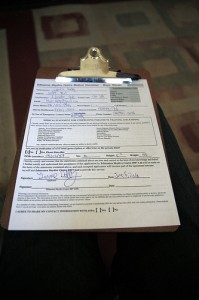Common scenario:
You have a parent, grandparent, or sibling die. A few days or weeks later you get a call from one of your siblings. That sibling has seen an attorney and “wants you to sign some paperwork in front of a notary.” You get the paper work and you see on that the top of the paper is some official looking language about a court and the words, “In re: Estate of _________.” The title below says, “Waiver of Priority, Consent to Appointment of Personal Representative, and Waiver of Notice and Bond.”
What does this Florida probate waiver document mean?
In short, it means that the relative giving you this document wants to be in charge of your deceased relative’s probate estate in Florida without any objection, dispute, or resistance from you in the probate court.
In a long answer, this document may contain language that would affect your rights in a Florida probate court proceeding if you sign it. Let’s break down the document:
1) Waiver of Priority – This language means waiver of your priority, if any, to be personal representative of a Florida probate estate. The personal representative is in charge of the estate assets. You may have priority if the deceased named you to be personal representative in his or her will, or if you are surviving spouse of an intestate estate.
2) Consent to Appointment as Personal Representative – In an intestate estate where the deceased dies without a will, the personal representative needs to be elected by the majority of the heirs to the estate. In other words, if you dad is the last parent to die and he has 3 children alive, then two children need to agree on the person that will be personal representative.
3) Waiver of Notice – this one is important. The waiver of notice asks you to waive your right to notice of a hearing for a court order appointing the personal representative and admitting the will to probate. It can also waive your right to challenge certain aspects of probate. Are you willing to waive your right to challenge the will, challenge the location of the probate proceeding or challenge the qualifications of the person seeking appointment as personal representative? That is what notice you are waiving. The waiver of notice will allow the person seeking your signature on the waiver to be appointed by the probate court as personal representative, the person will be able to get a hold of the deceased’s bank accounts and real estate, and you generally will not hear anything from this personal until you are asked to sign another waiver of the estate accounting requirements.
4) Waiver of Bond – a bond is occasionally put in place to protect beneficiaries of an estate from a personal representative’s wrongful or careless acts. The premium for the bond will come out of the estate and will add to probate costs.
Should I sign the Florida probate waiver?
It is best to have me review a will and talk about the situation to determine if you should sign a Florida probate waiver or not, but here are a few guidelines:
Yes if:
1) You have reviewed the will and feel that the will complies with the deceased’s wishes and does not appear to be a product of undue influence, fraud, or duress.
2) You feel the person asking you to sign the document is a responsible person. Can this person manage real estate or a small business if the estate has these assets? Do you think this person will run away with the money in the estate? Do you think this personal will mismanage the assets? Will this person listen to an attorney?
3) You want to reduce costs of probate. Signing the probate waiver will make things cheaper for the estate and will save time. There is no reason to be unnecessarily difficult.
4) Your family is close, gets along, and you answer “yes” to the questions I list in #2.
5) The personal representative is a bank or trust company. Any extra hoops you make a bank acting as personal representative go through, the more money goes to them from the estate funds.
No if:
1) The will is handwritten. Handwritten wills are fishy, do not agree to probate them.
2) The Vulture. The person asking you to sign the waiver gives you the waiver less than 4 days after the deceased passed away. This is my personal opinion, and 4 days might be cutting it short. Think about it, this person got a consult with an attorney and the attorney drafted the waiver within 4 days after death. Does the term vulture come into play? Did this person actually spend time with the deceased in the final days or did this person catch wind that the deceased had money?
3) Do you think this person would pay you back if you let them borrow money? In some way, you are letting a personal representative borrow money because this person is in charge of protecting the rights of the beneficiaries of the estate. If you think this person would squander the money or take it for themselves, then don’t sign any waiver.
Probate waivers are not something to be taken lightly. It would be prudent to have a Jacksonville probate attorney look over any will of a family member that is being probated. Don’t just rely on this article!
If this has been helpful for you please leave a comment, like it, or +1 it!
Picture by: Lewis Kelly
